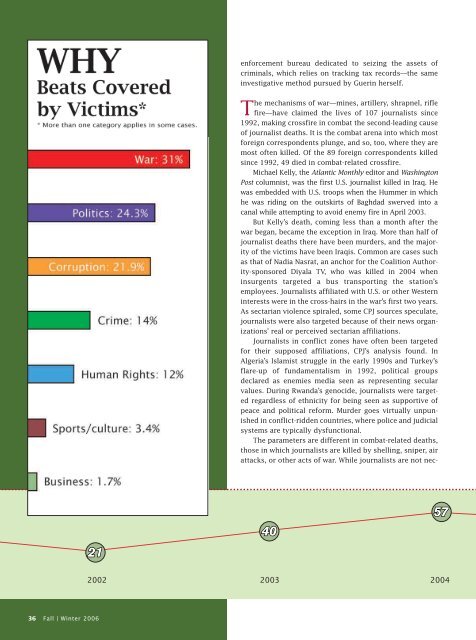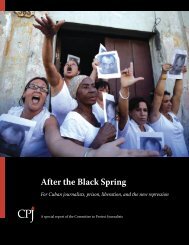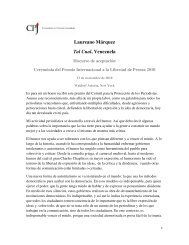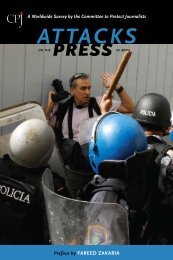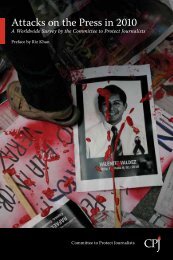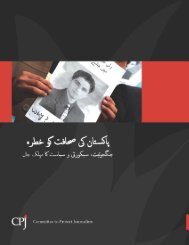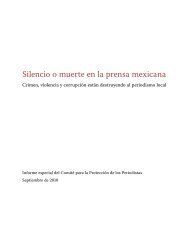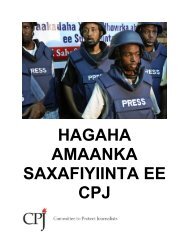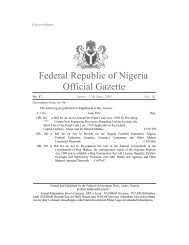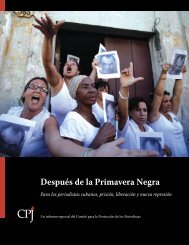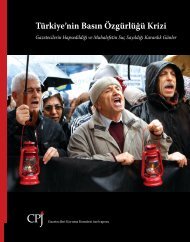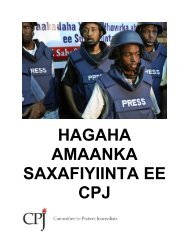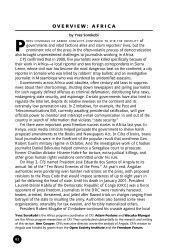Read the magazine online (PDF) - Committee to Protect Journalists
Read the magazine online (PDF) - Committee to Protect Journalists
Read the magazine online (PDF) - Committee to Protect Journalists
Create successful ePaper yourself
Turn your PDF publications into a flip-book with our unique Google optimized e-Paper software.
Mission Journal<br />
Development of Journalism (PROJOR), a media ethics and<br />
press freedom organization, said last year that 51 deputies<br />
in <strong>the</strong> lower chamber of parliament, about 10 percent, were<br />
partners or direc<strong>to</strong>rs in radio and TV stations nationwide.<br />
The institute filed a complaint with <strong>the</strong> at<strong>to</strong>rney general,<br />
arguing that political ownership of broadcast outlets violates<br />
Article 54 of <strong>the</strong> Constitution, which says federal legisla<strong>to</strong>rs<br />
cannot be affiliated “with a company that has<br />
obtained a concession for a public service.” The at<strong>to</strong>rney<br />
general’s preliminary analysis found no unlawful activity.<br />
Nona<strong>to</strong> Lima says radio hosts are compelled <strong>to</strong> praise <strong>the</strong>ir<br />
political patrons and attack <strong>the</strong>ir rivals.<br />
Political ownership of commercial radio is strong in<br />
Ceará and Pernambuco where, by most estimates, politicians<br />
at all levels of government own or control dozens of stations.<br />
But more troubling is <strong>the</strong> widespread political ownership<br />
of purportedly nonprofit stations. Government officials concede<br />
that some politicians have manipulated 1998 legislation<br />
that was intended <strong>to</strong> diversify broadcasting by allotting FM<br />
licenses <strong>to</strong> community associations or foundations.<br />
By law, community stations must be owned by nonprofit<br />
entities, and <strong>the</strong>y may not broadcast advertisements or political<br />
propaganda. Yet since <strong>the</strong> legislation was passed, politicians<br />
have rushed <strong>to</strong> set up “community” radio stations that<br />
are little more than mouthpieces, journalists and researchers<br />
<strong>to</strong>ld CPJ. Israel Bayma, a University of Brasília researcher<br />
whose work has been cited nationally, said that 87 percent of<br />
<strong>the</strong> 820 community license applicants presented <strong>to</strong> parliament<br />
for approval in 2002 were not legitimate nonprofit<br />
entities. Bayma also <strong>to</strong>ld CPJ that <strong>the</strong>se “nonprofit” stations<br />
donated 879,000 Brazilian reals (US$400,000) <strong>to</strong> municipal<br />
political campaigns nationwide in 2004.<br />
Francisco Câmpera, spokesman for <strong>the</strong> Ministry of<br />
CPJ<br />
Communications, acknowledged that <strong>the</strong> community radio<br />
law has been misused but said regula<strong>to</strong>rs were doing as<br />
much as <strong>the</strong>y could <strong>to</strong> verify ownership. “Our ministry<br />
abides by its legal obligations,” he said. “If a radio station is<br />
used politically and it is reported … it will be moni<strong>to</strong>red<br />
and it runs <strong>the</strong> risk of being shut down, as has happened in<br />
several cases.”<br />
Political influence permeates ano<strong>the</strong>r category of<br />
radio—stations that operate clandestinely, without any<br />
broadcasting concession or license. According <strong>to</strong> estimates<br />
widely referenced by Brazilian media, thousands of stations<br />
operate in such a manner. CPJ research found dozens<br />
of <strong>the</strong>se outlaw stations operating in Ceará and Pernambuco,<br />
many owned or controlled by politicians.<br />
Low professional standards and <strong>the</strong> strong influence of<br />
local politicians have made for an explosive mix in o<strong>the</strong>r<br />
parts of <strong>the</strong> world. In <strong>the</strong> Philippines, a record-breaking 17<br />
rural radio commenta<strong>to</strong>rs were slain over six years beginning<br />
in 2000, a spree attributed <strong>to</strong> politically inspired,<br />
attack-oriented commentary.<br />
In Brazil’s Nor<strong>the</strong>ast interior, CPJ research found, <strong>the</strong>re<br />
is little objective news reporting. “Journalism in <strong>the</strong> interior<br />
is basically done by radio hosts,” said Nona<strong>to</strong> Lima, a<br />
journalism professor and radio host at Ceará Federal University.<br />
“The radio host produces, writes, investigates, does<br />
everything.”<br />
New hosts typically obtain a certificate after taking a<br />
four-month course that includes a month of classes and<br />
three months of internship. “Their journalism is based on<br />
opinion, very partisan and political,” Lima said.<br />
Hosts typically seek alliances from politicians who provide<br />
<strong>the</strong>m with income and protection. At least some of <strong>the</strong>se<br />
politicians, scions of families that have ruled <strong>the</strong> interior as<br />
political dynasties, are known <strong>to</strong> terrorize <strong>the</strong>ir critics. The<br />
hosts, in effect, are <strong>the</strong> hired mouthpieces. “You have <strong>to</strong><br />
praise <strong>the</strong> owner and attack his adversary,” Lima said.<br />
Economic considerations also play a role. Since private<br />
advertising sources are scarce, radio hosts routinely sign<br />
contracts with municipal administrations <strong>to</strong> publicize and<br />
promote <strong>the</strong>ir activities. While such contracts are legal, <strong>the</strong>y<br />
sometimes include unlawful, under-<strong>the</strong>-table payments <strong>to</strong><br />
secure <strong>the</strong> radio host’s allegiance. Radio hosts <strong>the</strong>mselves<br />
are known <strong>to</strong> solicit such payments, journalists <strong>to</strong>ld CPJ.<br />
Yet as <strong>the</strong>y take on certain civic responsibilities, radio<br />
hosts end up serving functions that local governments provide<br />
with little efficiency or don’t provide at all. Speaking in<br />
plain, accessible language, commenta<strong>to</strong>rs try <strong>to</strong> directly<br />
address people’s needs by asking listeners for donations or<br />
by calling on authorities <strong>to</strong> correct a problem. They help find<br />
Radio hosts seek alliances with politicians who provide income and protection.<br />
The hosts are <strong>the</strong> hired mouthpieces.<br />
CPJ<br />
jobs for <strong>the</strong> unemployed and distribute wheelchairs for <strong>the</strong><br />
handicapped. In time, many charismatic radio hosts become<br />
effective media<strong>to</strong>rs between <strong>the</strong>ir audience and local authorities,<br />
turning <strong>the</strong>ir listeners’ gratitude in<strong>to</strong> political votes for<br />
<strong>the</strong>ir patrons. Some radio hosts decide <strong>to</strong> enter politics outright,<br />
ei<strong>the</strong>r on <strong>the</strong>ir own or at <strong>the</strong> request of politicians<br />
eager <strong>to</strong> pin <strong>the</strong>ir party’s fortunes on <strong>the</strong> hosts’ popularity.<br />
Márcia Vidal Nunes, a communications professor at<br />
Ceará Federal University, has documented <strong>the</strong> rise of several<br />
Fortaleza-based radio hosts and <strong>the</strong>ir transformation<br />
in<strong>to</strong> political candidates. Radio hosts know <strong>the</strong> needs of<br />
<strong>the</strong>ir audiences and “begin, little by little, placing <strong>the</strong>ir voices<br />
at <strong>the</strong> service of listeners, helping people who cannot exercise<br />
<strong>the</strong>ir rights as citizens make indirect contact through<br />
<strong>the</strong> radio with authorities who can offer a concrete solution,”<br />
she wrote in an authoritative<br />
2000 study that followed<br />
<strong>the</strong> careers of several hosts who<br />
entered politics.<br />
Cid Carvalho used his reputation<br />
as a crime-busting radio<br />
host as foundation <strong>to</strong> win office<br />
as a federal sena<strong>to</strong>r for Ceará in<br />
1986. Carvalho, who served<br />
one term, still hosts a daily onehour<br />
show on Fortaleza-based<br />
Cid Carvalho used his<br />
radio show as a stepping<br />
s<strong>to</strong>ne <strong>to</strong> public<br />
office but says political<br />
alliances have<br />
endangered <strong>to</strong>day’s<br />
commenta<strong>to</strong>rs.<br />
Radio Cidade and its sister station<br />
TV Cidade. “Radio is not<br />
dangerous,” he said. “Politics is<br />
dangerous.”<br />
Carvalho said <strong>to</strong>wns in <strong>the</strong><br />
interior are divided by longstanding<br />
political and family<br />
disputes. Politicians, he said, feel compelled <strong>to</strong> control<br />
local radio stations <strong>to</strong> get <strong>the</strong>ir message out.<br />
The climate in Pernambuco mirrors that of Ceará in<br />
many respects. “Almost all radio stations belong <strong>to</strong> political<br />
groups, and <strong>the</strong>se groups confront each o<strong>the</strong>r through <strong>the</strong><br />
stations,” said Aquiles Lopes, a reporter with <strong>the</strong> Recifebased<br />
daily Diário de Pernambuco. “This confrontation generates<br />
threats against journalists, who are usually <strong>the</strong> victims<br />
of political interests, not of <strong>the</strong>ir independent work.”<br />
The slaying of radio host José Cândido de Amorim Filho<br />
in <strong>the</strong> city of Carpina illustrates <strong>the</strong> murky convergence of<br />
press and politics. Amorim, also a city councilman, had<br />
been a sharp critic of <strong>the</strong> city’s mayor, both on <strong>the</strong> air and<br />
on <strong>the</strong> council. Lopes said police have reported several<br />
lines of investigation, including journalism, politics, and<br />
campaign debts. The inquiry is still open.<br />
Few inspired adulation and anger as did Nicanor Linhares,<br />
magnetic and controversial host of <strong>the</strong> <strong>to</strong>p-rated<br />
“Encontro Político” (Political Encounter) on Rádio Vale do<br />
Jaguaribe in <strong>the</strong> city of Limoeiro do Norte in Ceará.<br />
CPJ<br />
Dália Maia says that<br />
listening <strong>to</strong> Nicanor<br />
Linhares was a “sacred<br />
habit” in her home<strong>to</strong>wn.<br />
“Listening <strong>to</strong> Nicanor Linhares’ political program was a<br />
sacred habit for most of <strong>the</strong> people in <strong>the</strong> region,” said<br />
Dália Maia, a graduate student who grew up in <strong>the</strong> region.<br />
“People really loved him, particularly <strong>the</strong> poor. … He would<br />
help people find housing and employment and would start<br />
campaigns <strong>to</strong> get food and medicine for <strong>the</strong>m. On occasion,<br />
he would donate money and call on people <strong>to</strong> make<br />
donations.”<br />
Linhares was unusual in that he owned his own station,<br />
but his political views were open and strident. On his show,<br />
Linhares actively supported<br />
one mayoral campaign by<br />
fiercely criticizing rival candidate<br />
Maria Arivan de Holanda<br />
Lucena on a daily basis. Accusations<br />
of corruption were mixed<br />
with personal attacks. In turn,<br />
Linhares was assailed by two<br />
radio stations that supported<br />
Lucena; one station broadcast a<br />
“soap opera” that ridiculed Linhares’<br />
family and a supposed<br />
extramarital affair.<br />
The escalating invective<br />
grew deadly. In June 2003, two<br />
members of a no<strong>to</strong>rious criminal gang s<strong>to</strong>rmed in<strong>to</strong> <strong>the</strong><br />
booth where Linhares was taping his show, shot him several<br />
times at close range, and fled on a mo<strong>to</strong>rcycle.<br />
By Oc<strong>to</strong>ber 2003, state prosecu<strong>to</strong>rs said Lucena and her<br />
husband, federal judge José María de Oliveira Lucena, had<br />
ordered <strong>the</strong> murder. In May 2004, at <strong>the</strong> request of federal<br />
prosecu<strong>to</strong>rs, a judge from <strong>the</strong> Brasília-based Superior Tribunal<br />
of Justice, <strong>the</strong> nation’s second highest court, indicted<br />
<strong>the</strong> couple. Several o<strong>the</strong>r suspects have been charged. The<br />
Lucenas have yet <strong>to</strong> be tried. And people still speak vividly<br />
about Nicanor Linhares’ wake.<br />
“Nicanor based his work on both facts and opinions. He<br />
was a political journalist, he was a good person, a charitable<br />
person,” Maia said. “His wake was an event in <strong>the</strong> region.<br />
It looked like a pilgrimage.” ■<br />
A Look Back<br />
On <strong>the</strong> following pages, CPJ board members Michael<br />
Massing and Josh Friedman examine missions <strong>to</strong><br />
five countries over three decades. Massing, who led<br />
<strong>the</strong> organization’s first mission, says CPJ may have<br />
learned more than it imparted. Friedman describes<br />
<strong>the</strong> importance of Washing<strong>to</strong>n’s leadership in<br />
advancing press freedom.<br />
72 Fall | Winter 2006<br />
Dangerous Assignments<br />
73


